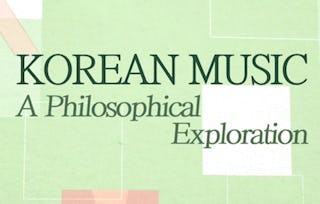Ce cours sera une vue d'ensemble du développement des méthodes théologiques en relation avec le contexte culturel de la Corée. A l'issue de ce cours, les apprenants pourront comprendre les influences culturelles sur le développement dynamique des églises coréennes et de la théologie indigène ; ils pourront également se faire une idée de leur propre image de Dieu et de leur imagination théologique dans leur propre contexte culturel.

Réimaginer Dieu dans le contexte coréen
Saisissez l'occasion de faire des économies ! Bénéficiez de 40 % de réduction sur 3 mois de Coursera Plus et d'un accès complet à des milliers de cours.

110 avis
Compétences que vous acquerrez
- Catégorie : Psychology
- Catégorie : Anthropology
- Catégorie : Cultural Diversity
- Catégorie : Culture
- Catégorie : Social Justice
- Catégorie : Intercultural Competence
Détails à connaître

Ajouter à votre profil LinkedIn
5 devoirs
Découvrez comment les employés des entreprises prestigieuses maîtrisent des compétences recherchées

Il y a 5 modules dans ce cours
Instructeur

Offert par
En savoir plus sur Philosophie
 Statut : Essai gratuit
Statut : Essai gratuitSungkyunkwan University
 Statut : Essai gratuit
Statut : Essai gratuitSungkyunkwan University
 Statut : Essai gratuit
Statut : Essai gratuitSungkyunkwan University
 Statut : Prévisualisation
Statut : PrévisualisationSungkyunkwan University
Pour quelles raisons les étudiants sur Coursera nous choisissent-ils pour leur carrière ?

Felipe M.

Jennifer J.

Larry W.

Chaitanya A.
Avis des étudiants
- 5 stars
82,88 %
- 4 stars
13,51 %
- 3 stars
2,70 %
- 2 stars
0 %
- 1 star
0,90 %
Affichage de 3 sur 110
Révisé le 28 nov. 2020
Studying about Korean Religious aspect gave me a clear awareness of their beliefs. Thankyou
Révisé le 21 juin 2020
I become understand the concept of God that interprets by human especially Korean, this course gave me insight about many understanding of God from many perspectives
Révisé le 28 juin 2020
Very informative course! The section on Freud seemed mostly unrelated to Korean contexts, but the latter three modules are fantastic.

Ouvrez de nouvelles portes avec Coursera Plus
Accès illimité à 10,000+ cours de niveau international, projets pratiques et programmes de certification prêts à l'emploi - tous inclus dans votre abonnement.
Faites progresser votre carrière avec un diplôme en ligne
Obtenez un diplôme auprès d’universités de renommée mondiale - 100 % en ligne
Rejoignez plus de 3 400 entreprises mondiales qui ont choisi Coursera pour les affaires
Améliorez les compétences de vos employés pour exceller dans l’économie numérique
Foire Aux Questions
Plus de questions
Aide financière disponible,

